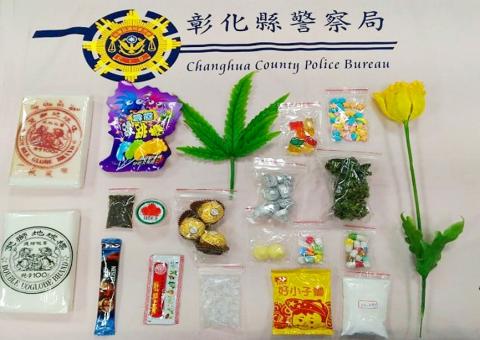More than 250,000 people in Taiwan have likely used illegal drugs, while an increasing number of people have tried unknown mixtures of drugs, the Food and Drug Administration (FDA) said yesterday.
The findings came from a FDA-commissioned survey conducted last year by National Taiwan University’s (NTU) College of Public Health, which collected data regarding illegal drug use from 18,262 people aged 12 to 64.
The survey found that 1.29 percent of respondents had used identifiable illegal drugs at least once, which could be extrapolated to about 204,000 people among the entire population of the same age.

Photo copied by Wu Liang-yi, Taipei Times
Once unknown blends of drugs — also known as “trail mix” — was factored in, the prevalence increased to 1.46 percent, or about 258,000 people, the FDA said.
It was the first time that the agency included “trail mix” drugs in the survey. These mixes are often repackaged to look like coffee sachets, cigarettes, plum powder, candy, chocolate or other snacks.
The five most common types of drugs taken by respondents were amphetamines (0.42 percent), ketamine (0.4 percent), ecstasy (0.36 percent), marijuana (0.32 percent) and “trail mixes” (0.18 percent), NTU professor Chen Wei-jen (陳為堅) said.
“Some young people did not know they were getting illegal drugs and mistook them for snacks or coffee. They could easily have accepted them if they were given by a friend,” FDA Division of Controlled Drugs Director Chu Yu-roo (朱玉如) said.
“Some people tried ‘trail mix’ drugs because they were curious,” Chen said. “However, the source, formula and dosage are often unknown, so they could sometimes damage the body or cause an overdose.”
Studies by forensic scientists have shown that such types of drug mixtures can easily cause acute kidney damage or irregular heartbeat, and they often contain synthetic cathinones, marijuana or ketamine, he said.
Among those who had tried illegal drugs, 70 percent did so “out of curiosity,” while 29.9 percent said that they first tried it at a classmate or friend’s house, Division of Controlled Drugs section chief Hsu Jui (徐睿) said.
While two-and-a-half times more males used single identifiable drugs than females, there was no significant gender difference in “trail mix” drug use, while more females aged 18 to 44 reported having taken drugs than males of the same age, she said.
As drug mixtures are being repackaged to resemble other products, people should be cautious about consuming food from unknown sources, reject drinks or food given by strangers, and try to leave when provided with suspected illegal drugs, Chu said.

Beijing could eventually see a full amphibious invasion of Taiwan as the only "prudent" way to bring about unification, the US Department of Defense said in a newly released annual report to Congress. The Pentagon's "Annual Report to Congress: Military and Security Developments Involving the People's Republic of China 2025," was in many ways similar to last year’s report but reorganized the analysis of the options China has to take over Taiwan. Generally, according to the report, Chinese leaders view the People's Liberation Army's (PLA) capabilities for a Taiwan campaign as improving, but they remain uncertain about its readiness to successfully seize

Taiwan is getting a day off on Christmas for the first time in 25 years. The change comes after opposition parties passed a law earlier this year to add or restore five public holidays, including Constitution Day, which falls on today, Dec. 25. The day marks the 1947 adoption of the constitution of the Republic of China, as the government in Taipei is formally known. Back then the Chinese Nationalist Party (KMT) governed China from Nanjing. When the KMT, now an opposition party in Taiwan, passed the legislation on holidays, it said that they would help “commemorate the history of national development.” That

Taiwan has overtaken South Korea this year in per capita income for the first time in 23 years, IMF data showed. Per capita income is a nation’s GDP divided by the total population, used to compare average wealth levels across countries. Taiwan also beat Japan this year on per capita income, after surpassing it for the first time last year, US magazine Newsweek reported yesterday. Across Asia, Taiwan ranked fourth for per capita income at US$37,827 this year due to sustained economic growth, the report said. In the top three spots were Singapore, Macau and Hong Kong, it said. South

Snow fell on Yushan (Jade Mountain, 玉山) yesterday morning as a continental cold air mass sent temperatures below freezing on Taiwan’s tallest peak, the Central Weather Administration (CWA) said. Snowflakes were seen on Yushan’s north peak from 6:28am to 6:38am, but they did not fully cover the ground and no accumulation was recorded, the CWA said. As of 7:42am, the lowest temperature recorded across Taiwan was minus-5.5°C at Yushan’s Fengkou observatory and minus-4.7°C at the Yushan observatory, CWA data showed. On Hehuanshan (合歡山) in Nantou County, a low of 1.3°C was recorded at 6:39pm, when ice pellets fell at Songsyue Lodge (松雪樓), a